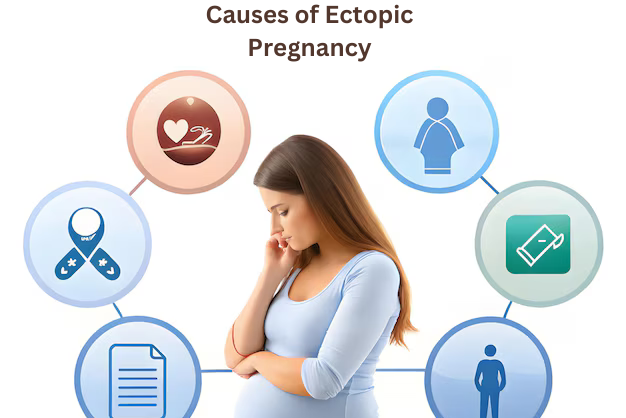Causes of Ectopic Pregnancy
An ectopic pregnancy occurs when a fertilized egg implants outside the uterus, typically in the fallopian tube. This condition can be dangerous if not diagnosed and treated promptly. In this blog, we will explore the common causes of ectopic pregnancy.
1. Fallopian Tube Blockages
Pelvic Inflammatory Disease (PID): Infections in the reproductive organs can lead to scarring and blockages in the fallopian tubes.
Endometriosis: This condition involves the growth of endometrial tissue outside the uterus, which can cause adhesions and blockages.
Previous Surgery: Pelvic surgeries, such as tubal ligation or appendectomy, can increase the risk of fallopian tube damage and blockages.
Congenital Abnormalities: Some women may be born with abnormal fallopian tubes that are more prone to blockage.
2. History of Ectopic Pregnancy
Women who have had one ectopic pregnancy are at a higher risk of having another.
3. Fertility Treatments
Assisted Reproductive Technologies (ART): Procedures like in vitro fertilization (IVF) can slightly increase the risk of ectopic pregnancy.
4. Sexually Transmitted Infections (STIs)
Untreated STIs, such as chlamydia and gonorrhea, can lead to pelvic inflammatory disease and increase the risk of ectopic pregnancy.
5. Endometriosis
Endometriosis, a condition where endometrial tissue grows outside the uterus, can cause adhesions and blockages in the fallopian tubes, increasing the risk of ectopic pregnancy.
6. Smoking
Smoking damages the fallopian tubes and can increase the risk of ectopic pregnancy.
7. Age
Women over 35 are at a slightly higher risk of ectopic pregnancy.
8. Certain Medications
Some medications, such as diethylstilbestrol (DES), can increase the risk of ectopic pregnancy.
9. Abdominal Surgery
Previous abdominal surgery can increase the risk of adhesions, which can lead to fallopian tube blockages and ectopic pregnancy.
10. Fertility Drugs
Certain fertility drugs can increase the risk of multiple pregnancies, including ectopic pregnancies.
Symptoms of Ectopic Pregnancy
Early symptoms of ectopic pregnancy may include:
- Abdominal pain on one side
- Vaginal bleeding
- Lightheadedness or dizziness
- Shoulder pain
- Nausea and vomiting
Seeking Medical Attention
If you experience any of these symptoms, it's important to seek immediate medical attention. Early diagnosis and treatment can prevent serious complications.
New World Fertility Centre, Delhi
At New World Fertility Centre, Delhi, our experienced fertility specialists can provide comprehensive care for women at risk of ectopic pregnancy. We offer:
Regular Prenatal Care: Routine check-ups and ultrasounds can help detect ectopic pregnancy early.
Fertility Treatments: If you have a history of ectopic pregnancy or other fertility issues, we can offer personalized treatment plans.
Post-Ectopic Pregnancy Care: We provide support and guidance for women who have experienced an ectopic pregnancy.
Conclusion
While the exact cause of ectopic pregnancy may not always be determined, understanding the risk factors can help prevent and manage this condition. If you have concerns about your risk of ectopic pregnancy, please consult with a healthcare professional.
FAQs
1. What is an ectopic pregnancy?
An ectopic pregnancy occurs when a fertilized egg implants outside the uterus, typically in the fallopian tubes. This condition is not viable and can be life-threatening if untreated.
2. What are the main causes of ectopic pregnancy?
The primary causes include fallopian tube damage from infections like pelvic inflammatory disease (PID), previous ectopic pregnancies, surgeries on the fallopian tubes, and conditions such as endometriosis.
3. Can previous ectopic pregnancy increase the risk of another?
Yes, women who have had one ectopic pregnancy have a higher risk of having another due to potential damage to the fallopian tubes or other structural issues.
4. How does pelvic inflammatory disease (PID) lead to ectopic pregnancy?
PID can cause scarring and blockages in the fallopian tubes, preventing the egg from reaching the uterus. This increases the likelihood of the egg implanting in the tube, leading to an ectopic pregnancy.
5. Are fertility treatments linked to ectopic pregnancy?
Yes, fertility treatments like IVF or using fertility medications can slightly increase the risk of ectopic pregnancy, as altered hormonal levels or embryo handling may affect where the egg implants.

 Oct-05-2024
Oct-05-2024